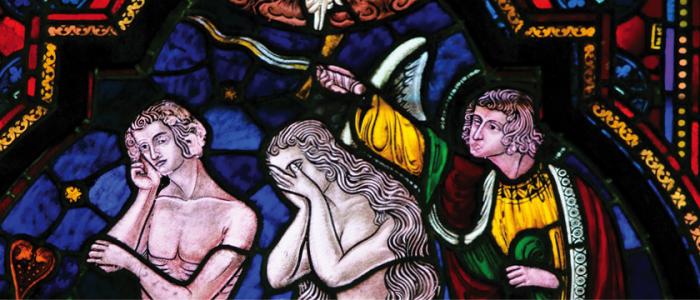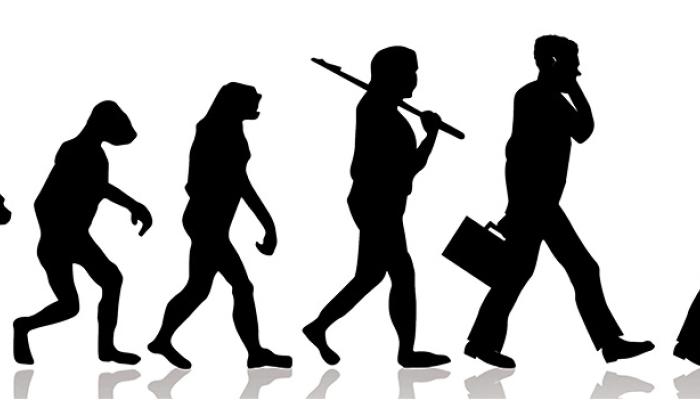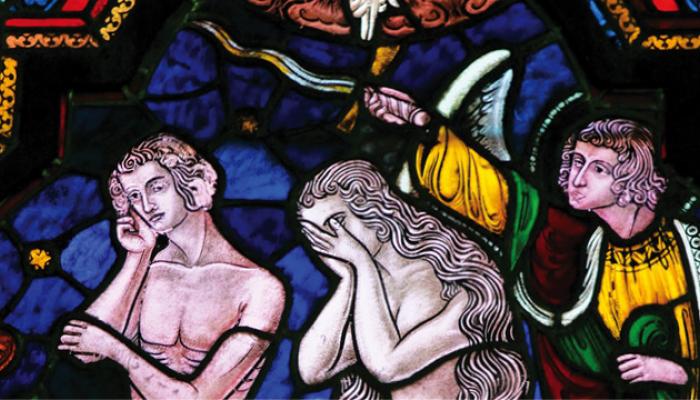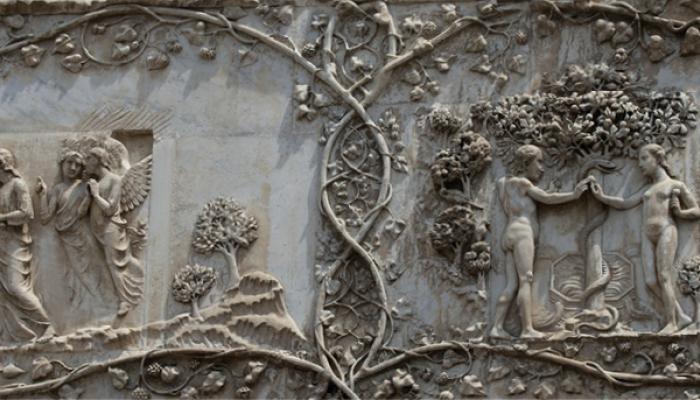
1.4 Was sind überhaupt Erbsünde und Sündenfall?
Obwohl Adam und Eva von Gott ein ganzes Paradies gegeben worden ist, wollten sie noch mehr. Ihre Sünde war motiviert durch Egoismus, wie es für die meisten Sünden der Fall ist. Sie haben sich gegen Gott gewandt und haben sich dann versteckt (Gen 3,8)Gen 3,8: Als sie an den Schritten hörten, dass sich Gott, der HERR, beim Tagwind im Garten erging, versteckten sich der Mensch und seine Frau vor Gott, dem HERRN, inmitten der Bäume des Gartens.. Das hat zu einer Distanz zwischen Gott und den Menschen geführt. Dies ist der Sündenfall oder der Fall der Menschheit: Der Weg, auf dem die Sünde in die Welt gekommen ist.
Gott hat der Menschheit einen freien Willen gegeben. Du kannst nur jemanden lieben, wenn du einen freien Willen hast. Wir können uns für Gott entscheiden, aber wir können ihn auch ablehnen; Sünde ist das Ergebnis. Wegen der Erbsünde, die von Adam und Eva geerbte Sünde, sind wir Menschen nicht länger perfekt, wie Gott es ursprünglich in der Schöpfung beabsichtigt hatte. Indem Jesus auf die Erde gekommen ist, wollte er diese Situation durch die Einsetzung des Sakraments der Taufe verändern.
What was the original condition of the human person according to the plan of God?
In creating man and woman God had given them a special participation in his own divine life in holiness and justice. In the plan of God they would not have had to suffer or die. Furthermore, a perfect harmony held sway within the human person, a harmony between creature and Creator, between man and woman, as well as between the first human couple and all of creation. [CCCC 72]
Was it part of God’s plan for men to suffer and die?
God does not want men to suffer and die. God’s original idea for man was paradise: life forever and peace between God and man and their environment, between man and woman.
Often we sense how life ought to be, how we ought to be, but in fact we do not live in peace with ourselves, act out of fear and uncontrolled emotions, and have lost the original harmony that man had with the world and ultimately with God. In Sacred Scripture the experience of this alienation is expressed in the story of the Fall. Because sin crept in, Adam and Eve had to leave paradise, in which they were in harmony with each other and with God. The toil of work, suffering, mortality, and the temptation to sin are signs of this loss of paradise. [Youcat 66]
How should we understand the reality of sin?
Sin is present in human history. This reality of sin can be understood clearly only in the light of divine revelation and above all in the light of Christ the Savior of all. Where sin abounded, he made grace to abound all the more. [CCCC 73]
What is sin?
At the core of sin is a rejection of God and the refusal to accept his love. This is manifested in a disregard for his commandments.
Sin is more than incorrect behavior; it is not just a psychological weakness. In the deepest sense every rejection or destruction of something good is the rejection of good in itself, the rejection of God. In its most profound and terrible dimension, sin is separation from God and, thus, separation from the source of life. Only through Jesus do we understand the abysmal dimension of sin: Jesus suffered God’s rejection in his own flesh. he took upon himself the deadly power of sin so that it would not strike us. The term that we use for this is redemption. [Youcat 67]
What was the first human sin?
When tempted by the devil, the first man and woman allowed trust in their Creator to die in their hearts. In their disobedience they wished to become “like God” but without God and not in accordance with God (Genesis 3:5). Thus, Adam and Eve immediately lost for themselves and for all their descendants the original grace of holiness and justice. [CCCC 75]
What is original sin?
Original sin, in which all human beings are born, is the state of deprivation of original holiness and justice. It is a sin “contracted” by us not “committed”; it is a state of birth and not a personal act. Because of the original unity of all human beings, it is transmitted to the descendants of Adam “not by imitation, but by propagation”. This transmission remains a mystery, which we cannot fully understand. [CCCC 76]
What other consequences derive from original sin?
In consequence of original sin human nature, without being totally corrupted, is wounded in its natural powers. It is subject to ignorance, to suffering, and to the dominion of death and is inclined toward sin. This inclination is called concupiscence. [CCCC 77]
Are we compelled to sin by original sin?
No. Man, though, is deeply wounded by original sin and is inclined to sin. Nevertheless, with God’s help he is capable of doing good.
In no single case are we obliged to sin. In fact, however, we sin again and again, because we are weak, ignorant, and easily misled. A sin committed under compulsion, moreover, would be no sin, because sin always involves a free decision. [Youcat 69]
Man was made after the image and likeness of God; but sin marred the beauty of the image by dragging the soul down to passionate desires. Now, God, who made man, is the true life. Therefore, when man lost his likeness to God, he lost his participation in the true life; separated and estranged from God as he is, it is impossible for him to enjoy the blessedness of the divine life. [St. Basil, Ascetical Works, Chap. 1 (MG 31, 869)]
Original sin? What does the Fall of Adam and Eve have to do with us?
Sin in the strict sense implies guilt for which one is personally responsible. Therefore the term “Original Sin” refers, not to a personal sin, but rather to the disastrous, fallen state of mankind into which the individual is born, even before he himself sins by a free decision.
In talking about Original sin, Pope Benedict XVI says that we must understand “that we all carry within us a drop of the poison of that way of thinking, illustrated by the images in the Book of Genesis … . The human being does not trust God. Tempted by the serpent, he harbors the suspicion … that God is a rival who curtails our freedom and that we will be fully human only when we have cast him aside … . Man does not want to receive his existence and the fullness of his life from God … . And in doing so , he trusts in deceit rather than in truth and thereby sinks with his life into emptiness, into death” (Pope Benedict XVI, December 8, 2005). [Youcat 68]





